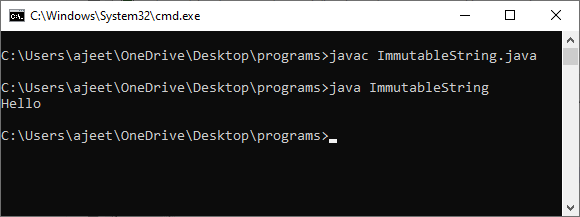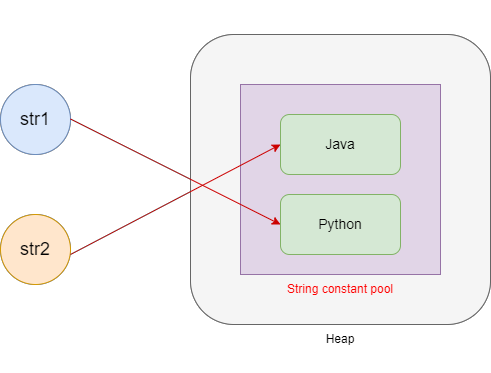Why Are Strings Immutable in Java? Ideal Practices and Use Cases
Why Are Strings Immutable in Java? Ideal Practices and Use Cases
Blog Article
Discovering the Benefits of Unalterable Strings in Modern Shows Paradigms
In the world of modern-day programs paradigms, the idea of unalterable strings stands as a keystone of robust software advancement. The advantages they supply exceed simple ease; they essentially modify the way information is handled within applications. By embracing unalterable strings, programmers can guarantee enhanced information stability, boosted string safety and security, streamlined debugging processes, boosted security steps, and effective efficiency optimization. These advantages work as a testimony to the profound effect that embracing immutability can carry the integrity and performance of software program systems.
Improved Information Stability

By stopping the modification of string things, immutability removes the risk of unintended modifications to the information they hold. This not just boosts the protection of the information but likewise enhances the dependability of the code that depends on these strings.
Immutability also sustains safer multithreading environments, as concurrent access to unalterable strings does not pose the danger of data corruption via simultaneous adjustments. This building streamlines the process of handling strings in parallel programs scenarios.
Essentially, immutability functions as a safety shield around the data stored within strings, improving their integrity by guaranteeing that when specified, their worths stay the same throughout the program's implementation.

Enhanced String Safety
Immutable strings boost the string safety and security of programs by making certain that once a string object is produced, its worth can not be changed. This residential or commercial property eliminates the danger of concurrent threads trying to modify the same string simultaneously, which might result in information corruption or irregular states in the program - Why are strings immutable in Java?. In a multi-threaded environment, where multiple threads accessibility and manipulate information concurrently, the immutability of strings supplies a level of safety and security by ensuring that the information remains unmodified throughout its lifecycle
Streamlined Debugging Processes
Offered the boosted string safety and security facilitated by unalterable strings, a significant advantage arises in the realm of simplified debugging procedures. Unalterable strings, as soon as created, can not be changed, making it easier to trace the circulation of data and recognize the resource of insects in a program. This immutability guarantees that strings remain consistent throughout the execution of the program, lowering the chance of unexpected modifications that might lead to mistakes.
When debugging with mutable strings, designers usually run into problems where a string's worth is modified unintentionally, making it challenging to determine the source of a pest. Nonetheless, with immutable strings, the information stays unchanged, enabling designers to concentrate on assessing the actual logic of the code instead than finding where and when a string was customized improperly.
Furthermore, unalterable strings streamline the debugging process by enabling much easier reproduction of pests. Since unalterable strings do not change state, designers can recreate and study bugs extra effectively, causing quicker recognition and resolution of issues within the codebase. This streamlined debugging operations inevitably adds to greater software program high quality and improved overall development efficiency.

Increased Security Procedures
Enhancing data security and fortifying system integrity, the use of unalterable strings in software program applications adds dramatically to raised safety and security procedures. Immutable strings likewise play an essential role in stopping common protection susceptabilities such as barrier overflows and SQL shot strikes, as efforts to manipulate string data at runtime are naturally restricted.
In addition, the immutability of strings enhances the predictability of program habits, making it much easier to verify inputs and protect against unforeseen modifications that might jeopardize security. This predictability streamlines the process of bookkeeping and confirming code, enabling programmers to determine prospective protection technicalities a lot more efficiently. On the whole, incorporating unalterable strings into software advancement techniques not only enhances the toughness and integrity of applications but also strengthens their resilience against protection dangers.
Efficient Efficiency Optimization
When dealing with mutable strings, operations like concatenation or substring creation commonly result in the creation of new string things, leading to memory expenses and enhanced handling time. By allowing strings to stay consistent and this page unchangeable, immutable strings promote much better memory administration and caching possibilities, ultimately enhancing the total efficiency of the software.
Unalterable strings additionally play an essential function in multithreaded environments by promoting string security. Why are strings immutable in Java?. Because unalterable strings can not be modified as soon as created, they can be shared across strings without the threat of unanticipated modifications, decreasing the need for synchronization devices and boosting concurrency. Furthermore, immutable strings streamline debugging procedures as developers can rely on that a string's worth will remain regular throughout the program's implementation, eliminating potential mistakes caused by mutable state changes. More hints Finally, the use of unalterable strings not only improves safety and security however also considerably contributes to the reliable performance optimization of contemporary software application systems.
Verdict
Finally, the advantages of utilizing immutable strings in modern-day programming paradigms can not be overstated. Boosted information honesty, boosted string safety, simplified debugging procedures, enhanced protection procedures, and effective efficiency optimization all add to the overall efficiency of programs tasks. By including unalterable strings right into programming practices, designers can gain from a much more durable and trustworthy codebase.
Immutability, a vital attribute of strings in programming languages such as Java and Python, makes sure that when a string object is created, it can not be altered or modified.Unalterable strings boost the string safety of programs by making sure that as soon as a string object is created, its worth can not be customized. Unalterable strings also play a crucial function in stopping usual security vulnerabilities such as barrier overflows and SQL injection attacks, as attempts to manipulate string information at runtime are naturally restricted.
By enabling strings to stay stable and constant, immutable strings facilitate much better memory monitoring and caching opportunities, ultimately these details increasing the total efficiency of the software application.
Unalterable strings simplify debugging procedures as designers can rely on that a string's worth will remain constant throughout the program's execution, removing potential errors caused by mutable state changes.
Report this page